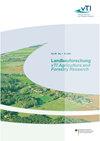Policies for agroecology in France: implementation and impact in practice, research and education
IF 0.7
4区 农林科学
Q3 AGRICULTURE, MULTIDISCIPLINARY
引用次数: 4
Abstract
The challenge of feeding the growing world population while reducing the adverse environmental effects of agricul ture will only be met by combining fundamental changes in agricultural and food systems. France is considered to be one of the first countries to develop policies in agro ecol ogy and translate them into concrete programmes and laws. This paper analyses the historical development of different agroecologyrelated programmes and policies and their implemen tation. It discusses whether they have made an impact and considers the obstacles and resisting forces that have become apparent. The work reported here is mainly based on literature review using scientific papers and grey literature and web source analysis as well using informal dis cussion with experts. The policy for agroecology started in 2010 with wide ranging debates about challenges for agricul ture in France in preserving natural resources and developing an economically viable and socially acceptable agricultural system. In 2012, the French Ministry of Agriculture and Food launched the “Agroecological Project for France” supporting education, research and incentives for farmers to move for ward with agroecology. Within this general project different sectoral programmes were set up and launched, addressing farming practices and innovation led by individuals or farmer groups. These also looked at incentivising research in nation al research programmes. New agricultural curricula for high schools and higher education institutions were also included in the scope of the project. The policy initiated in 2010 re sulted in acceleration and stronger implementation of education and training, and in increased research focussing on certain topics. It also stimulated a certain ‘transition’ in the agricultural sec tor with a wider acceptance of agroecological ap proaches. It brought forward pioneers which stimulated innovation based on agroecological principles. The policy measures aimed directly at farmers have facilitated more implementation of agroecological practices, stronger recognition of the impor tance of biodiversity for agriculture, and increased conversion to organic agriculture regardless of the farming system. How ever, the French policies have failed to reduce the use of pesti cides in conventional agriculture. The policy development at national level was supplemented by French initiatives at Euro pean and international level to introduce more agroecology components and principles in future policies.法国农业生态学政策的实施及其在实践、研究和教育中的影响
只有将农业和粮食系统的根本变化结合起来,才能应对养活不断增长的世界人口同时减少农业对环境的不利影响的挑战。法国被认为是最早制定农业生态政策并将其转化为具体方案和法律的国家之一。本文分析了不同农业生态学相关计划和政策的历史发展及其实施情况。它讨论了它们是否产生了影响,并考虑了已经变得明显的障碍和阻力。本文报告的工作主要基于使用科学论文和灰色文献的文献综述、网络来源分析以及与专家的非正式讨论。农业生态学政策始于2010年,当时人们就法国农业在保护自然资源和发展经济可行和社会可接受的农业系统方面面临的挑战展开了广泛的辩论。2012年,法国农业和食品部启动了“法国农业生态项目”,支持教育、研究和激励农民转向农业生态。在这一总体项目中,设立并启动了不同的部门方案,涉及个人或农民团体领导的农业实践和创新。这些研究还着眼于激励国家研究计划中的研究。高中和高等教育机构的新农业课程也列入了该项目的范围。2010年启动的这项政策加快并加强了教育和培训的实施,并增加了对某些主题的研究。它还刺激了农业部门的某种“转型”,让人们更广泛地接受农业生态方法。它提出了基于农业生态学原理的开拓者,激发了创新。直接针对农民的政策措施促进了农业生态实践的更多实施,更有力地认识到生物多样性对农业的重要性,并增加了向有机农业的转变,无论农业系统如何。然而,法国的政策未能减少传统农业中杀虫剂的使用。国家层面的政策制定得到了法国在欧洲和国际层面的举措的补充,以在未来的政策中引入更多的农业生态学组成部分和原则。
本文章由计算机程序翻译,如有差异,请以英文原文为准。
求助全文
约1分钟内获得全文
求助全文
来源期刊

Landbauforschung
AGRICULTURE, MULTIDISCIPLINARY-
CiteScore
4.40
自引率
0.00%
发文量
0
审稿时长
>36 weeks
期刊介绍:
Die Landbauforschung Völkenrode – FAL Agricultural Research ist seit 1950 das wissenschaftliche Publikationsorgang der Bundesforschungsanstalt für Landwirtschaft. Sie wird von der FAL selbst herausgegeben, erscheint vierteljährlich und enthält sowohl deutsch- als auch englischsprachige Artikel.
In der Landbauforschung Völkenrode – FAL Agricultural Research werden Forschungsergebnisse der FAL veröffentlicht. Sie ist eine multidisziplinär ausgerichtete Zeitschrift, die die verschiedenen Facetten der Agrarforschung einschließt und besonderes Augenmerk auf deren interdisziplinäre Verknüpfung legt.
 求助内容:
求助内容: 应助结果提醒方式:
应助结果提醒方式:


